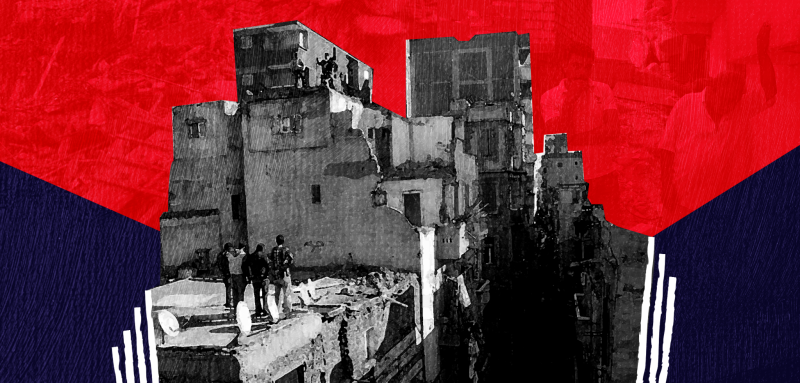In the past seven years, 500 Egyptians perished under the rubble due to the collapse of their residential buildings. This happened amidst Egyptian government’s inaction to repair derelict properties or demolish them, once their residents have been given alternatives places to live.
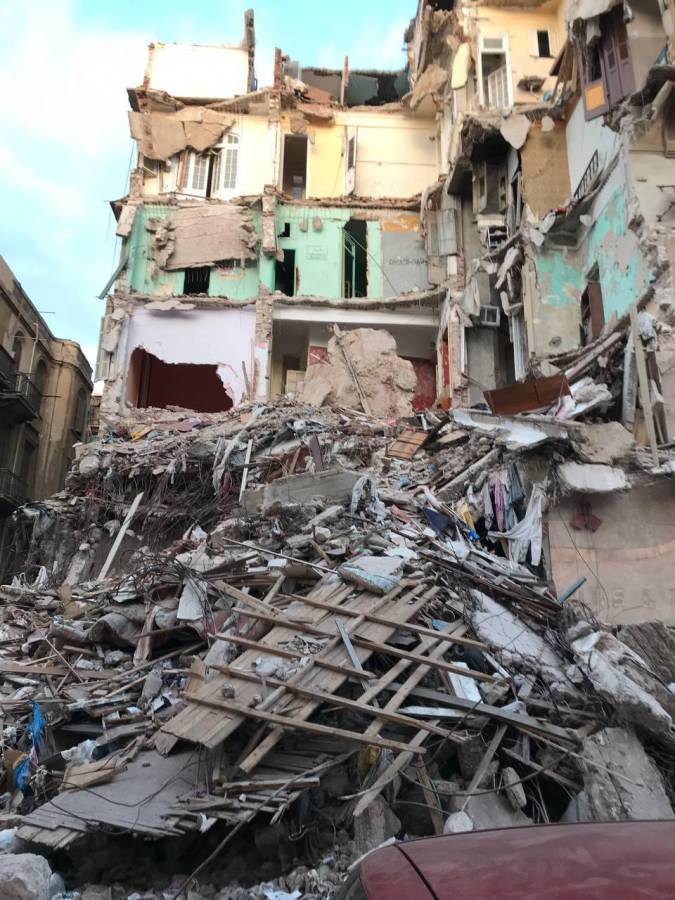
A collapsed building in El-Raml area in Alexandria
Moaman Atwa led us through the rubble of a collapsed property in Al-Dakhila Al-Jabal in Al-Ajami neighborhood, west of Alexandria. Atwa is one of the survivors of this collapsed dwelling where eight of its occupants had perished, four men and four women including
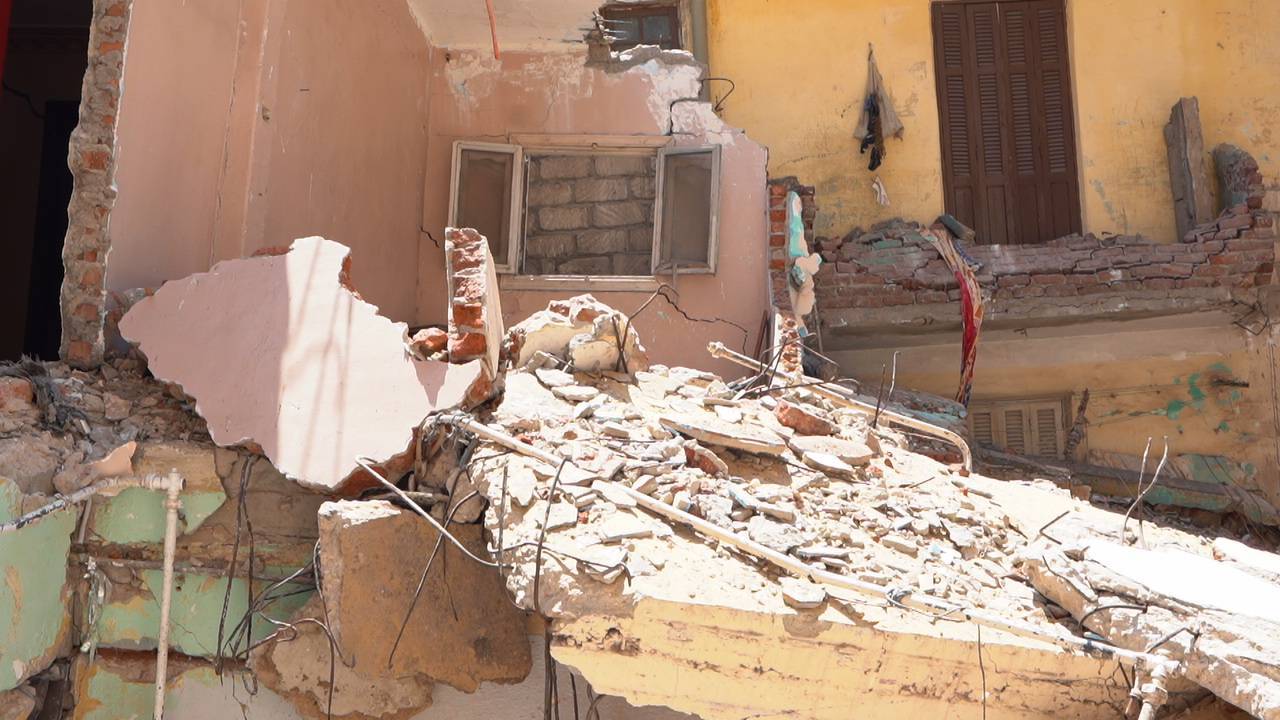
“I rushed home from work and saw that the house had collapsed. My mother was underneath a concrete pillar, taking her last breath. We could not move the pillar as doing so would have meant destabilizing the scene further risking the lives of those screaming under the rubble,” Atwa said of the disaster. He pointed towards his “new apartment” which was completed less than two years ago when he got married and moved to live in it. It collapsed after it split in two halves; the first half collapsed on his wife, daughter and five others while the second has been reduced to dust mixed with the blood of the eight victims.
The disaster was not limited to the building’s collapse only. The damage also extended to ten other properties that are all derelict. The sewage water eroded the properties’ foundations, pushing the occupants to abandon them to live on the street and in a neighboring school.
The collapse of the property in Al-Dakhila in early July 2021 is not unusual for Egypt. This investigative report documents around 1,000 such incidents recorded between 2014 and 2020. According to data from the archives of Egyptian newspapers, these incidents killed around 500 – one third of them are children and more than one third of them are women – a thousand more were injured – one third of them are women and children.
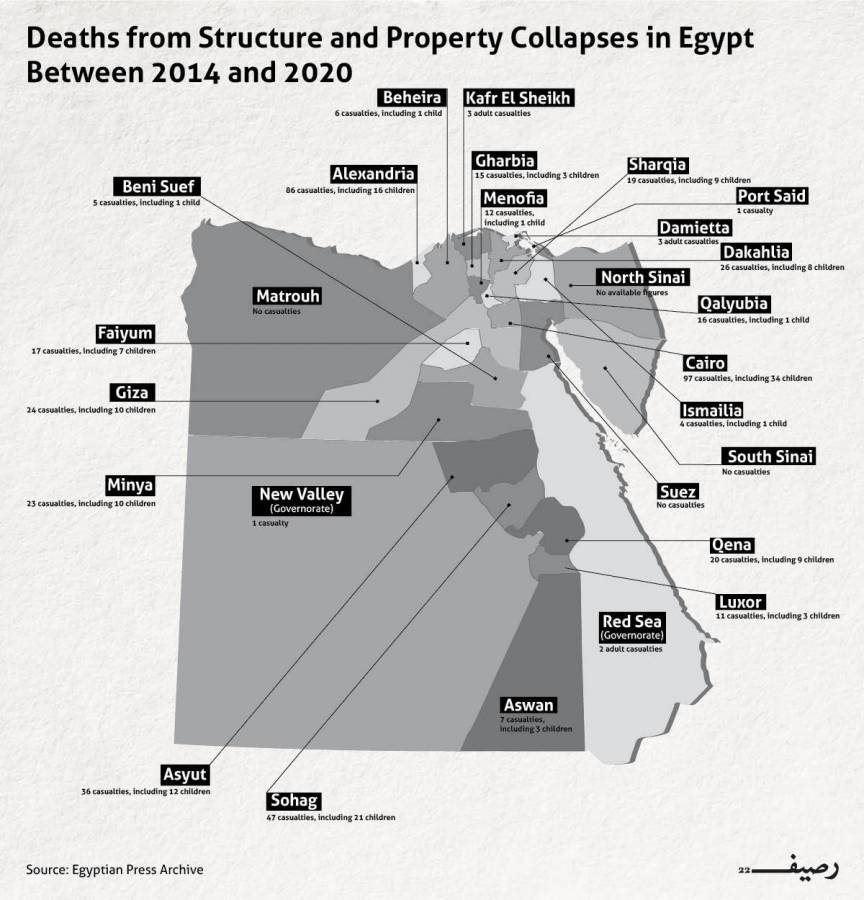
There’s more to the disaster than meets the eye
According to the Egyptian Central Agency for Public Mobilization and Statistics, there are approximately 14.5 million residential properties in the country – these are tower blocs, buildings, villas, rural housing and chalets – around 100,000 of them are categorized as irreparable and “dangerous buildings” that must be demolished.
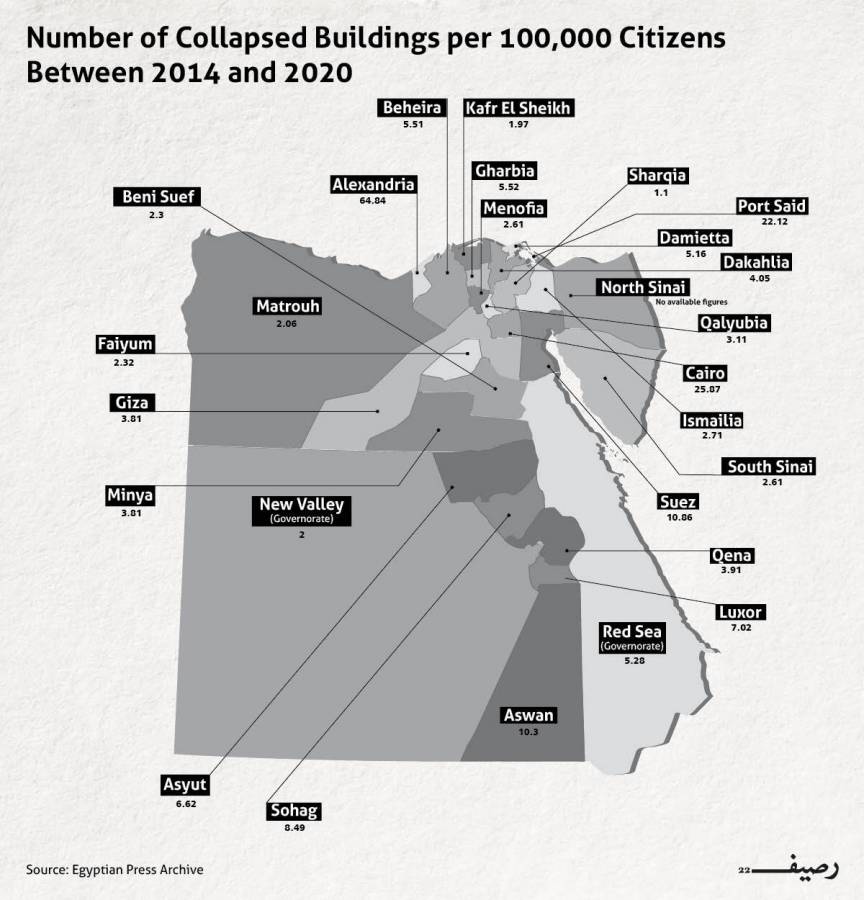
“Few months ago, I was sitting in our house’s living room when parts of the wall and ceiling started to fall. We all panicked. The house has become at risk of collapsing. The walls can collapse any moment. The balcony shakes when we stand on it to the extent that my sister cries from fear,” said Iman (a pseudonym) as she explained that the walls of their house began to crack when a neighboring building was demolished 14 years ago. At a later stage, and while trying to repair their house, the engineer inspecting the works told them it was “irreparable and it must be completely demolished and rebuilt.”
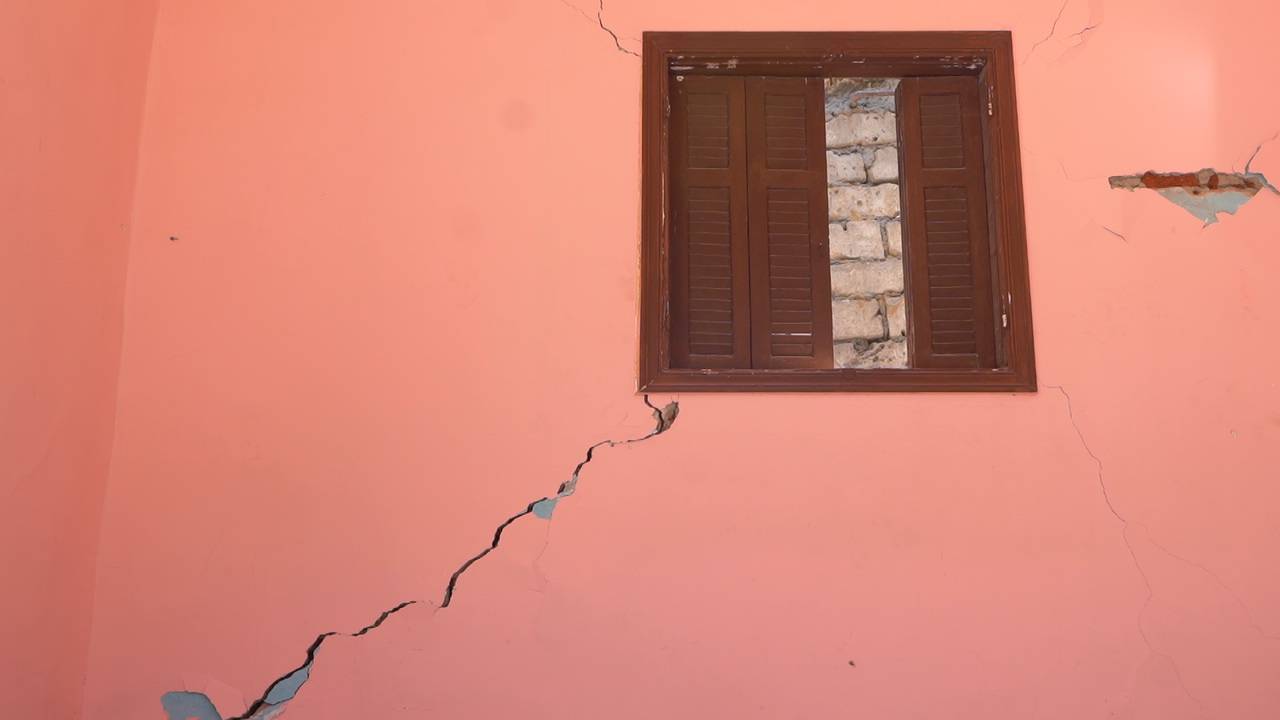
When an adjacent house collapsed killing three of a family of five, Iman’s family submitted a report to the governorate’s administration stating that “their building is not safe and is unfit for human habitation” in order to get a permit to demolish it. But the process was not that easy.
Iman (25 years old) added: “I thought the process will be quick especially that our lives are at risk. However, what happened was the complete opposite. The measures were very bureaucratic and required bribing officials to proceed with processing the paperwork.”
In the past 7 years, 500 Egyptians perished under rubble due to the collapse of their homes. This happened amidst the government’s inaction to repair derelict properties or demolish them, once their residents have been given alternatives places to live.
“The inspection committee did not show up at the property, until two weeks later. They inspected the building only from the exterior. Based on this, an order was issued to remove two floors and repair the rest of the building. We tried to repair it two years ago, but the engineer said it was irreparable and must be demolished. The inspection committee was not qualified at all, so we submitted a complaint but it has not been addressed until now,” she said.
Thus, Iman and her family had no other choice but to abandon their home which is located in the center of Sohaj governorate where more than 60 properties collapsed during that same period. The governorate of Sohaj ranks third after the governorates of Alexandria and Cairo in terms of the number of collapsed buildings.
Iman’s family and Atwa’s family and neighbors are not the only ones who had to leave their home. More than 2,500 families had to evacuate their properties during the past seven years, either temporarily or permanently, due to these incidents. More than half of these affected families lived in Alexandria and Cairo, the two cities where around half of the incidents of collapsed buildings took place.
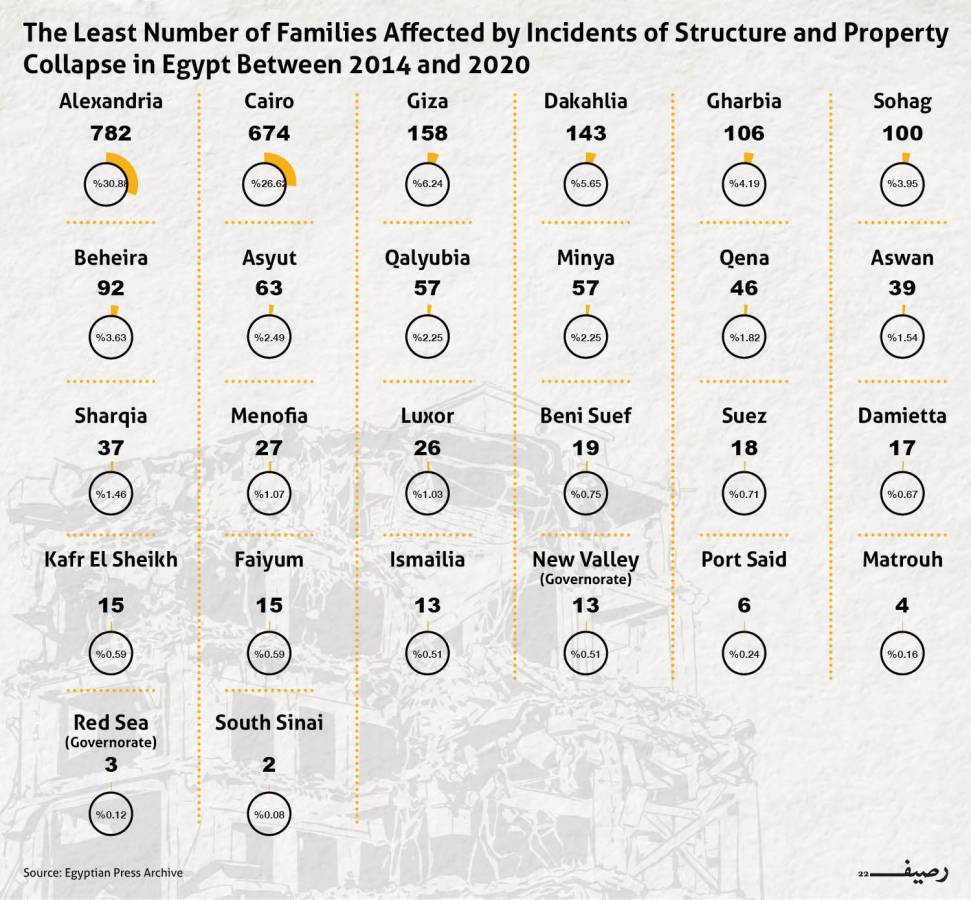
Affected owners and tenants waiting
“Houses are at risk of collapse. Their walls are full of cracks, the balconies are collapsing. An earthquake can damage the gas pipes and leads to a leakage and this would end in a real disaster.”
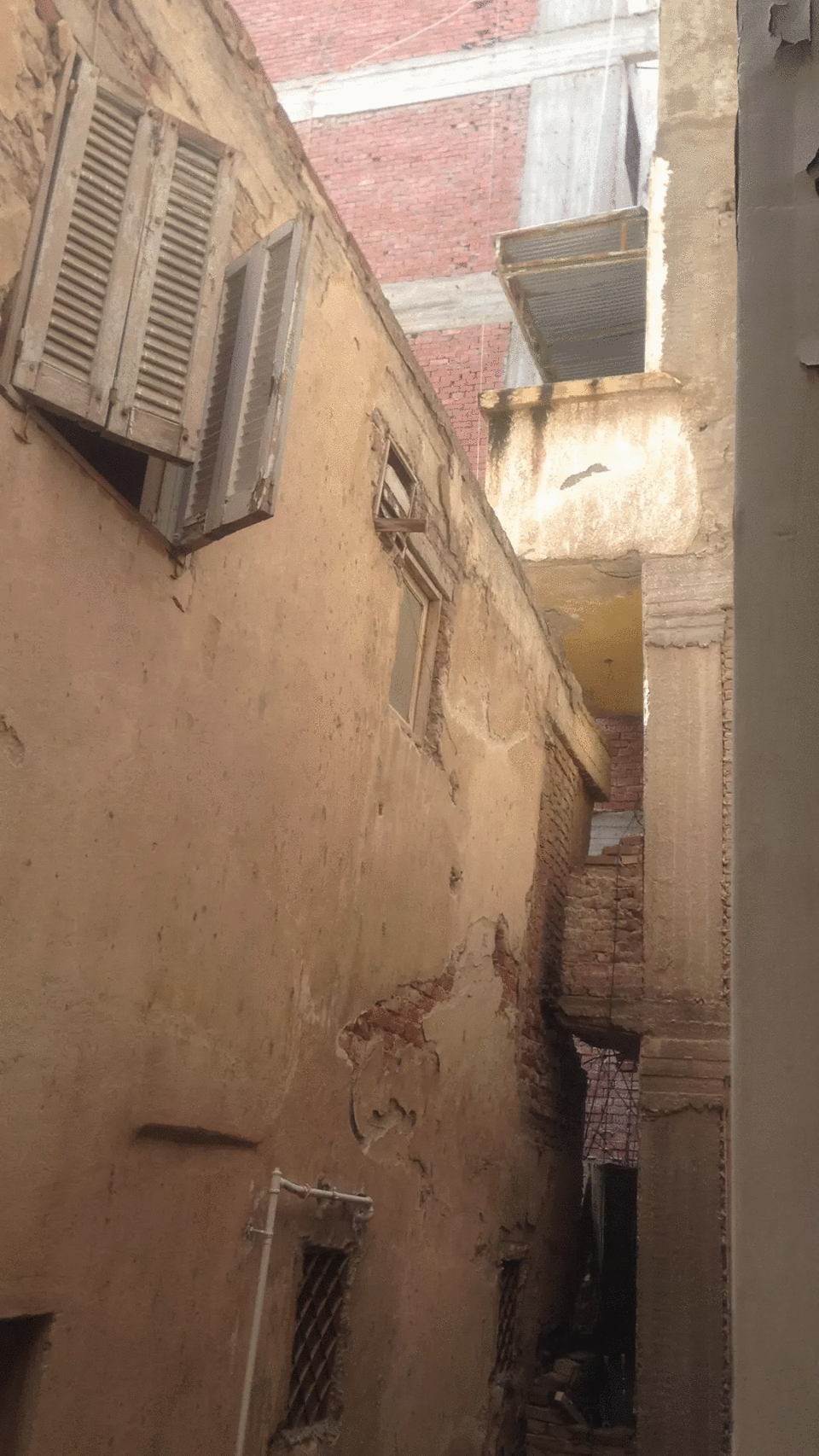
These are the words of Khaled Al-Salmouni (60 years old), the owner of two properties that are at risk of collapse in the neighborhood of El Soyof in the area of Al-Muntazah in Alexandria, the governorate where around one third of the incidents of collapsed buildings occurred.

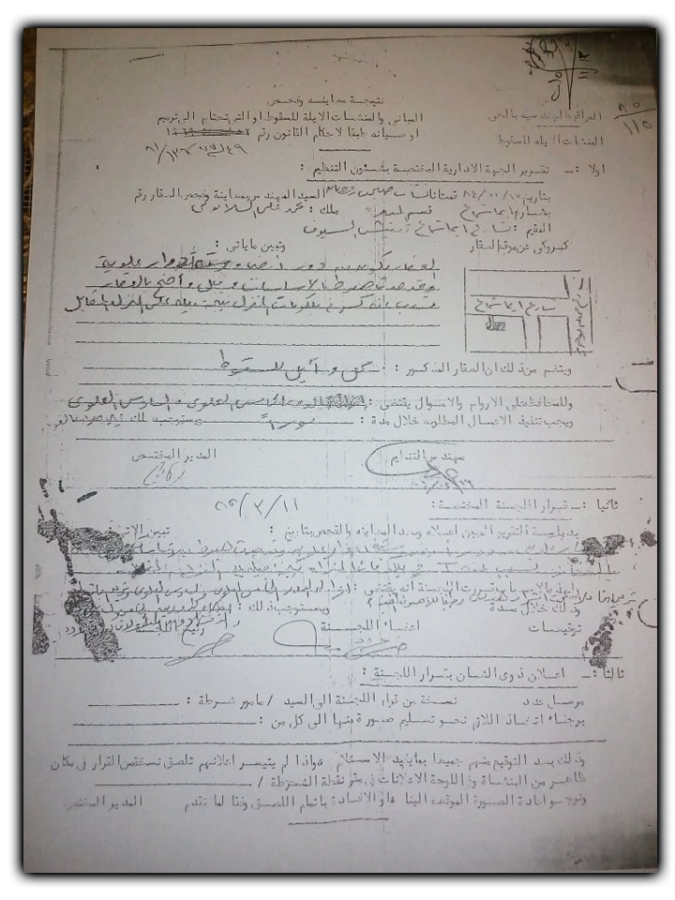
The first building was built in the 1950s, and the second one was built in 1979. When one of them partially collapsed, the public utility
Al-Salmouni and his family decided to leave as he was unwilling to jeopardize his family’s life and “risk their death under the rubble.” Al-Salmouni’s rent return from the two buildings is negligible and the tenants refused to evacuate the properties despite their derelict state.
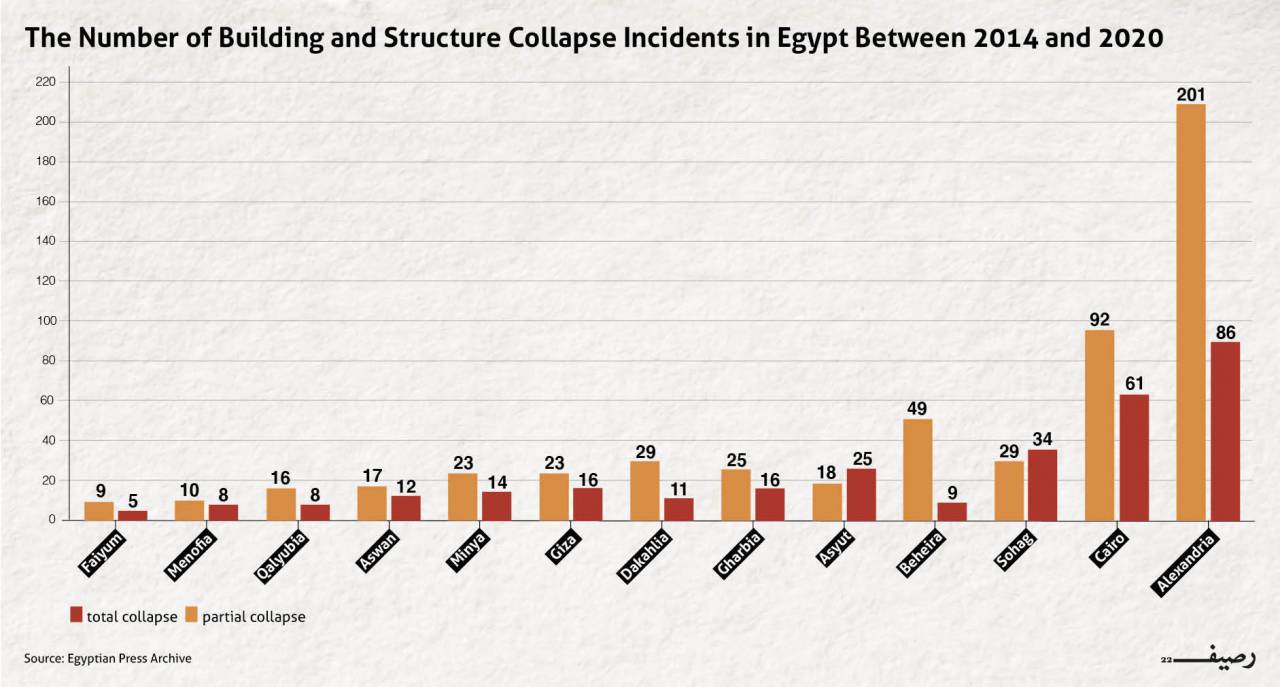
Al-Salmouni’s story is one of many. Mariam Mohammad owns a building at risk of collapse in Shobra in Cairo, where more than 150 buildings collapsed during the aforementioned period.
Mariam, has been inhabiting the building with her sister and mother, said that when the ceiling of the first floor collapsed ten years ago and after the stairs cracked, an order was issued to evacuate the building in order to repair it. However, the tenants refused to evacuate it, and they only repaired the falling ceiling.
This happened in 2010. And now, none of the tenants want to help her repair it. “The rent earned from the apartments don’t generate enough income, due to their old rental contract, to permit the landlord to carry out the repair works needed. Rental income is around 50 Egyptian pounds per month/flat in an area where the rent should have been 1,500 Egyptian pounds (approximately $100)”.
When an adjacent house collapsed killing three members of a family, Iman submitted a report to the administration stating that “their building is not safe and is unfit for habitation” in order to get a permit to demolish it. The process wasn't easy.
The old rental law is one side of the story. Islam Mohammed (27 years old), an owner of a property that’s at risk of collapse in Kafr El-Zayat in the governorate of Gharbia said that tenants who had rented according to the old rental law cannot afford to evacuate their apartments in buildings that are at risk of collapse. He explained that the situation of one of his tenants, for instance, “is tragic as he is an old man with no family or place to go after his wife and children have passed away and there is nowhere for him to go.”
The cases of Atwa and the inhabitants of the building that collapsed in Al-Dakhila and the problem of Islam Mohammad are similar as the tenants in such derelict buildings have no place to go and cannot afford renting somewhere else.
The head of Al-Ajami neighborhood Ibrahim Al-Sayyif Moussa refused to answer our queries concerning tenants complaints.
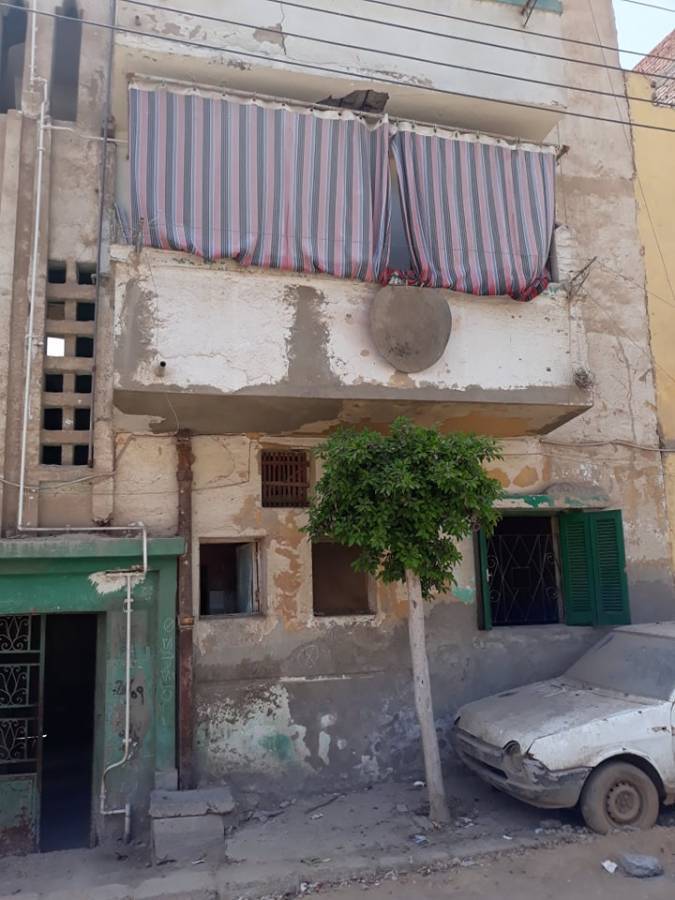
Apart from what these stories tell us, data shows that more than half of the families affected by these incidents lived in “old property” and that three quarters of the collapsed buildings were occupied residential ones.
According to a blog that calls itself the “Shadow” or alternative Ministry of Housing, and focuses on social justice and urbaniszation
Who is to blame?
From among the 1,000 incidents we documented, we found that an order to demolish or repair were issued in 25% of the cases. We also discovered that no information were available regarding 60% of the cases whether occupants had been informed of any order to repair of demolish the properties prior to their collapse.
“No one even asked about us. None of the officials followed up on our situation. We contacted the office of Alexandria’s administration, and they told us there weren’t currently any alternative apartments in the governorate. They did not even remove the rubble that poses a threat to residents,” said Atwa, explaining his daily suffering now that he and his
“The house collapsed because the sewage water eroded its foundations. This water is now also affecting the foundations of all houses in the area. This happened due to the works done to raise the ground level seven months ago without changing the old sewage pipes, resulting in sewage water leaking into the building’s foundations,” he added.
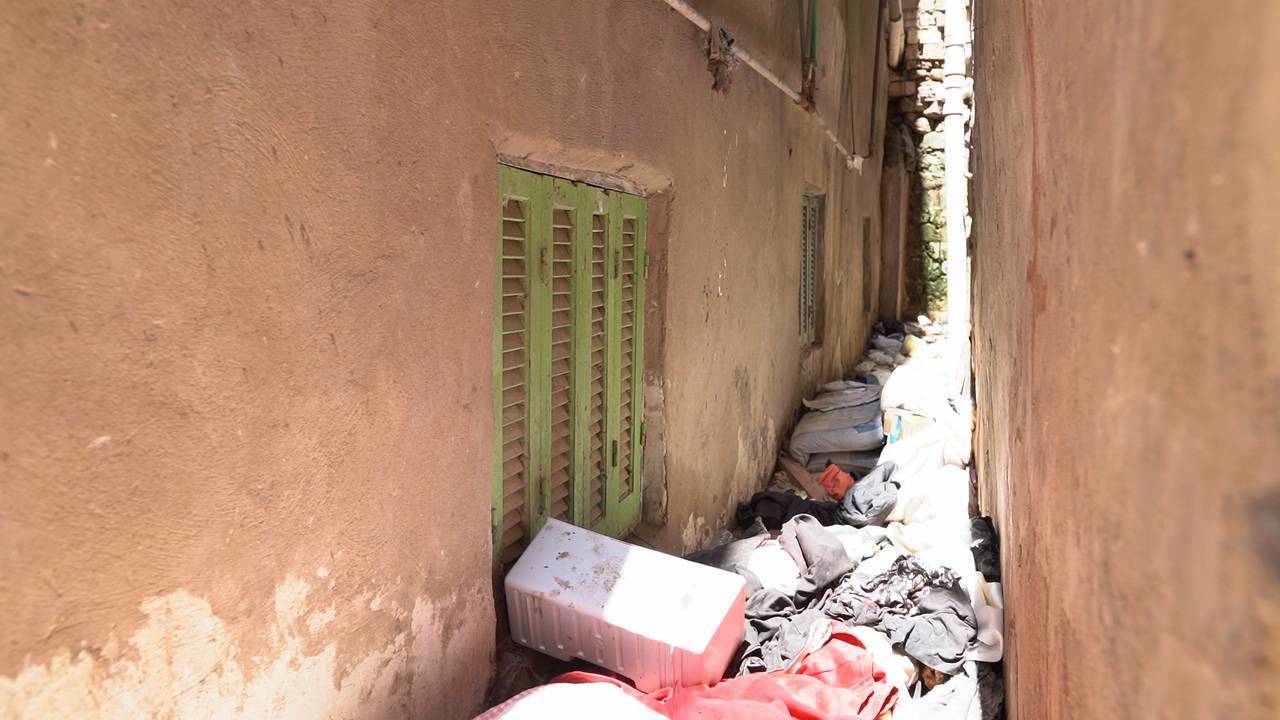
Hussein, one of the tenants affected by the collapse of Al-Dakhila building, said that the engineer in charge of raising the ground level in the neighborhood had told him: “These houses are like the deads; they must be washed before burial.”
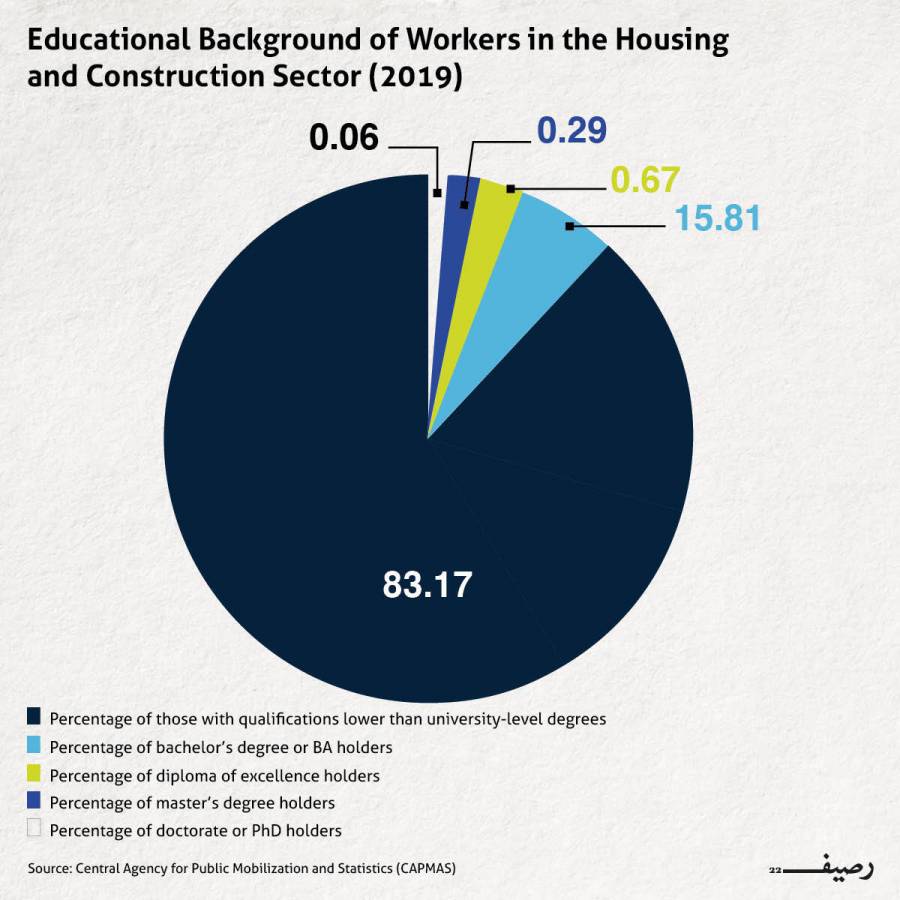
The condition of buildings that are still standing is not any better than those which have collapsed. Al-Salmouni, the owner of the two properties that are at risk in the neighborhood of El Soyof in Alexandria, said that he submitted a report to the public utility police stating that his two buildings were at risk of collapse. The police department informed the neighborhood’s administration of the report; however, the latter demanded he submits papers that proves he paid his property taxes.
“Employees at the neighborhood’s administration asked me to get the paperwork for the two properties. They sent me, through the police department, an order to build some supporting pillars, and they did so without carrying out any inspection. This means that the landlord has to pay the repair costs,” he said.
After a verbal argument between him and the employees at the neighborhood’s administration, the engineer in charge of inspection “cordially” agreed to go with him and inspect the two buildings. After she saw them from outside, she asked him where could the tenants go if they were to lose their homes, so he told her this was not his problem. She then said: “The demolition order does not fall within our jurisdictions but within the jurisdictions of the governorate’s administration.”
Al-Salmouni’s story confirms what Iman, the owner of the building in Sohaj, had said – the paperwork for any property, no matter how dangerous it is, will not be processed without bribing employees at the neighborhood’s administration.
“If you do not (bribe them), your paperwork will be ignored for at least six months. If you do not give them 20,000 or 30,000 Egyptian pounds, they will not process your papers and they will decide that the house only needs repair. This is an additional cost on the owner. If the building collapses, the owner is the only one who will be legally held accountable,” he added.
Mohammed Al-Zarif, the structural engineer who supervised the demolition of the “leaning Azarita” building in Alexandria and who has carried out structural engineering studies about damaged buildings, attributed the collapse of buildings in Egypt to the end of “their life span,” adding that most of them “had not been repaired and had been structurally neglected.”
Al-Zarif, who is also a member of the Syndicate of Engineers, noted that some buildings had flawed structural designs and were built by contractors without any supervision from trained engineers.
Hala Hassanein, an activist in urban, heritage and sustainability issues, agrees with Al-Zarif. She added that the main reason behind the collapse of buildings was “the corruption of
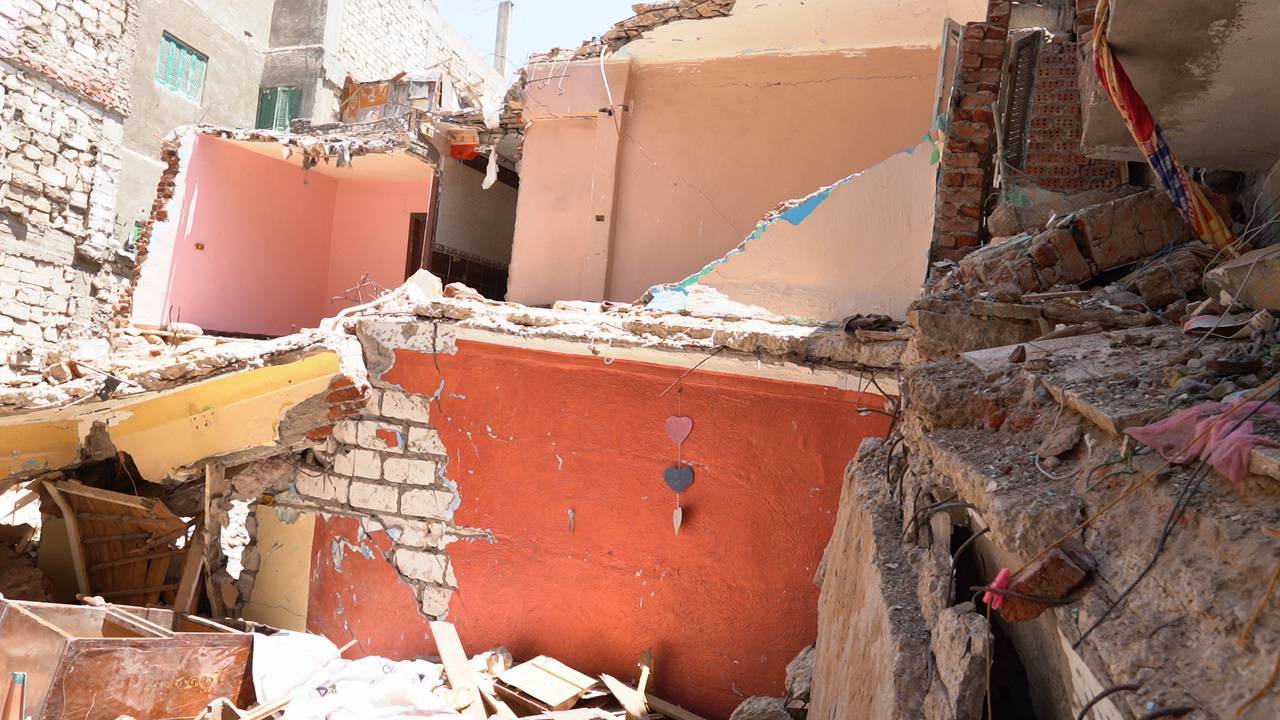
Hassanein quoted Doctor Tarek Wali, a consultant in preserving architectural heritage, saying: “Putting an end to the collapse of buildings begins with establishing a good sanitation network because sewage water affects the foundations of properties.”
According to Wali and Hassanein, deceit, manipulation of construction material, lack of repairs, the end of houses’ and sanitation networks’ life spans, not finalizing the assessment for buildings that are at risk of collapsing, the difficulties which citizens face to attain construction licenses through legitimate channels and the corruption of
The Ministry of Local Development, the Ministry of Housing, Utilities & Urban Communities and head of the Syndicate of Engineers in Alexandria, Hesham Saaoudi, did not respond to our request for comment on the findings of this investigation.
Commenting on the work of the government and the Syndicate of Engineers to resolve this crisis, Al-Zarif said there are plans to solve the problem, however they are hindered by executive bodies such as
Regarding the syndicate’s role, he said: “I have not seen or heard the syndicate voice any interest worth mentioning regarding this problem.”
Amid this chaos in the real estate sector in Egypt, Atwa stands full of regret in front of the debris of the building that collapsed in Al-Dakhila in Alexandria. He spent all his money on “his dream home” which was reduced to rubble.
Raseef22 is a not for profit entity. Our focus is on quality journalism. Every contribution to the NasRaseef membership goes directly towards journalism production. We stand independent, not accepting corporate sponsorships, sponsored content or political funding.
Support our mission to keep Raseef22 available to all readers by clicking here!
Interested in writing with us? Check our pitch process here!
